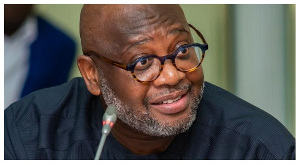“Whether believers or not, we are all agreed today that the earth is essentially a shared inheritance, whose fruits are meant to benefit everyone. … Hence every ecological approach needs to incorporate a social perspective which takes into account the fundamental rights of the poor and the underprivileged.” Pope Francis
"VRA to use sea water for coal plant" was the title of an article that appeared in the business section of Ghana Web on March 21st 2016.
The published article was on the collaboration between Shenzhen Energy Group Co., Ltd. (SEC) and the Volta River Authority (VRA) to develop a 2×350MW supercritical coal-fired power generating facility (including the affiliated coal handling terminal) along the coastline of Ghana. The coal fired plant will be built at Abaono in the Ekumfi district, Central Region.
We, Ghana citizens at home and abroad, support the position of the Ghana Youth Environmental Movement to vehemently oppose the building of a coal fired plant for electricity for a number of reasons:
(1) Coal is a dangerous fossil fuel generation of power because it causes health hazards. In 2011, the American Lung Association (ALA) released a report stating that: “Particle pollution from power plants is estimated to kill approximately 13,000 people a year.” The ALA report pointed to coal-fired power plants as among the worst offenders.
(2) Coal power poses environmental hazards like smog and its attendant dangers. The consultants scoping report on Environmental and Social Impact Assessment of the project, acknowledges these environmental hazards;- release of poisonous gas into the atmosphere; threat to aquatic life; management of the 5 million tons of ash to be generated by the plant. Yet, to date, no national debate has been organized to fully discuss the implications of the destruction to the environment.
(3) The Paris Accords of 2015 calls for all nations to phase out coal power. Coal-burning plants world - wide are one of the worst industrial polluters. In some regions of the world coal burning plants produce approximately one-third of carbon dioxide (CO2, a major contributor to global warming), 40% of mercury (highly toxic if ingested or inhaled), one-quarter of nitrogen oxide (an ingredient found in smog) and two-thirds of our sulfur dioxide (a component of acid rain). The Environmental Protection Agency (EPA) of the US is on record to acknowledge that sulfur dioxide promotes heart disease and asthma, while nitrogen oxides destroy lung tissue.
(4) Every nation - including China, US and Europe- is phasing out coal powered plants to reduce negative environmental effects. The biggest coal mining corporation in the world, Peabody, is also phasing and/or closing out coal mines worldwide. Why does Ghana want to embrace an obsolete technology that is dangerous to the environment?
(5) There are several alternatives to coal power that are environmentally friendly and do not contribute to climate change. These alternatives include wind, solar, gas, thermal, nuclear and hydro power.
(6) The claim that “Ekumfi Aboano became the preferred location to accommodate the coal-fired power generating plant, especially for reasons of minimal environmental impact and implications” is at best dubious. We are not convinced. The scoping report itself acknowledges that: “there is limited knowledge and awareness of the operational features of coal-fired
power plant and the advancement in technological efficiency and pollution controls.” For one, there are alternate power generating technologies that in the long run will be safer and environmentally friendly than the preferred coal-fired plant to be built at Ekumfi Abaono.
We support the call by the Ghana Youth Environment Movement to reject coal-fired plants in Ghana. It is an obsolete technology and represents a serious threat to the safety of our environment; particularly air quality and water bodies.
Respectfully Submitted on behalf of Concerned Ghanaians for a Clean Environment.
Prof. Steve Panford (Retired) Former Chair & Director of Liberal Arts and Arts, New York City College of Technology, City University of New York
Prof. Kwamina Panford - Former Vice Provost, North Eastern University, Boston
Prof. K. Botchway – Professor, New York City College of Technology, City University of New York
Mr. Thomas Panford - Retired Civil Servant, New York City
Mr. Kingsley Duker - Retired Civil Servant, Finance Department, New York City
Mr. Kwabena Achampong - Senior Administrator, Home care Services, New York City
Mr. Kwame Danso - Attorney At Law, New York City
Dr. Ohene Frempong - Prof. Emeritus, University of Pennsylvania Medical School
Mr. Kkwabena Akosah - Former Correspondent, BBC
Mr. Billy Essilfie - Former Marketing Manager, TOPP Ghana
Cc: Volta River Authority (VRA)
Shenzhen Energy Ghana
Environmental Protection Agency (EPA)
Ministry of Environment, Science & Technology (MEST)
Business News of Thursday, 19 May 2016
Source: Panford, Kwamina
















